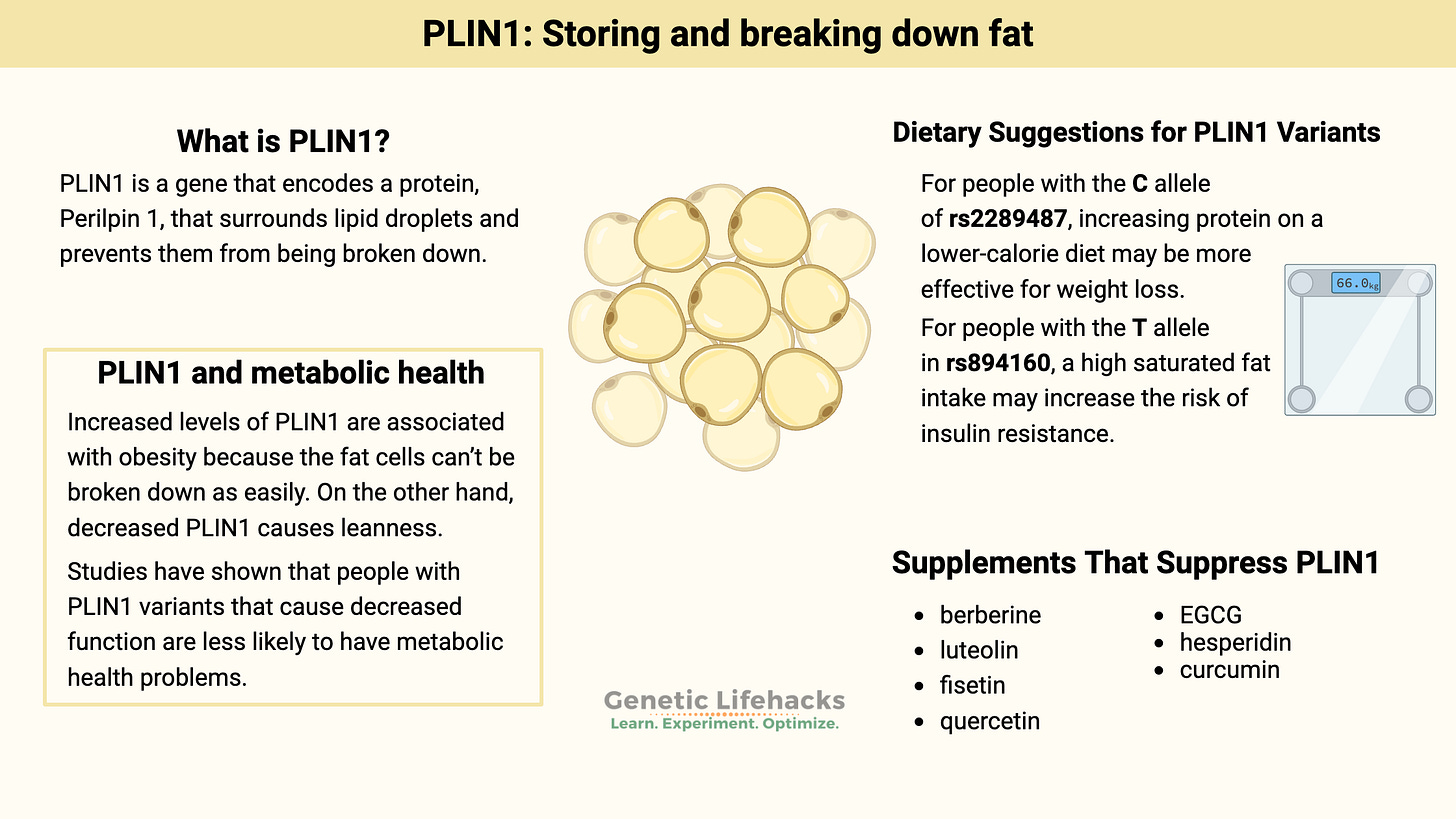PLIN1 and Metabolic Health - Plus - Updated Supplement Connections
And a short rant on privacy and AI
New Genetic Lifehacks article:
PLIN1: Storing and Breaking Down Fat
PLIN1 is a protein that regulates lipolysis – the breakdown of fat cells for energy. Genetic variants in PLIN1 can affect how easily someone loses weight on different diets. This new member-requested article explains PLIN1 and the genetic variants that impact weight loss on different types of diets.
Note that PLIN1 is just one of many genes related to weight and dieting. Check out the whole weight-related genes category for more.
Updated articles:
Supplements with Genetic Connections
There's a lot of information on Genetic Lifehacks, and by the time you get to the Lifehacks sections of several articles, you may lose track of which supplements are good for which genes or conditions. (I know, and I wrote the articles!)
The Supplements with Genetic Connections page brings together many different genes and multiple topics - from the point of view of specific supplements.
Privacy and AI in Genetics:
Long-time readers know that I'm a bit obsessed with keeping genetic data private. Sequencing.com sent out an updated AI Use Policy this week. They have implemented an AI ChatBot that users can talk to about their genes.
While I applaud them for openly explaining their privacy policy for their SequencingAI Chat and SequencingAI Reports, I also strongly encourage all of their customers to read it thoroughly and understand the privacy implications.
In their AI Use Policy is that their chatbot is using ChatGPT on the backend and that user information including their genetic data and health questions will be transferred to ChatGPT. They correctly state that they have no control over what ChatGPT does with that personal and genetic information. This transfer of private data is what is happening with most genetics or health-related AI chatbots -- it's just that most companies aren't as upfront about their privacy policies.
I want to encourage everyone to use caution when sharing your genetic and health information - from not posting your genes on the Facebook to not uploading your genetic and health data into AI chatbots. Even if you think you are being anonymous by not including your name in the search, the tracking technology and profiling is incredible.
On a similar note - I've also had a spate of email questions lately that start with "Google AI search results say...." or "ChatGPT says you're wrong about..." While I love using new technology and think AI is great for making suggestions, I have consistently found that all "AI" search and chatbots, even the latest and greatest, are wrong on detailed genetic questions. Not just a little wrong - but completely and totally made up information or just 100% the opposite of what is correct. So please be careful when using any of the AI search or chat options to double-check and verify absolutely everything they say. (Yes, I am still fascinated by the promise of AI, but it still just isn't there yet when it comes to scientific details.)
Interested in Preventing Alzheimer's?
Click here to download a .pdf eBook on Alzheimer's Prevention Research. This is my take on what current Alzheimer's and genetics research shows about the pathways to target for prevention.
What I've been reading:
This article is a few years old, but still very interesting. The results showed "We found that serum folate and to a lesser extent, vitamin B12 concentrations, were significantly correlated with DNA methylation of p16, MLH1, and MGMT".
Methylation of DNA turns off the gene so it's not transcribed. This is one way of regulating which genes are made into proteins in a cell. In this case, the genes turned off by higher serum folate include p16, MLH1, and MGMT, which are genes that protect against cancer mutations.
Researchers have found that fossilized Neanderthal bones found in 2015 in France are from a Neanderthal line that was likely isolated from other Neanderthal communities for over 50,000 years.
3) PFAS and neurological development
A new study shows that PFAS exposure during development alters GABA neurons through the PPAR pathway and causes dark-phase hyperactivity -- essentially alters the neurological development. The study is in zebrafish, but the genetic pathways involved are also found in humans.
Graphical overviews for the new article (for all the visual learners):





